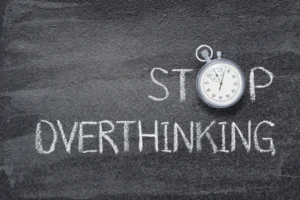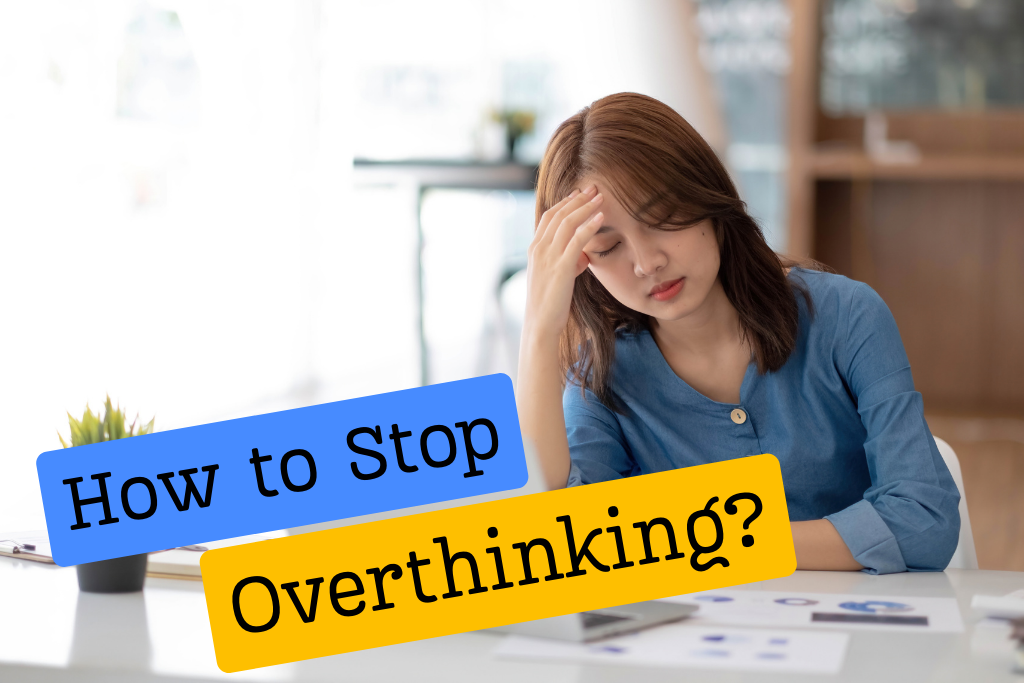Understanding Overthinking
Overthinking is defined as the act of excessively analyzing, rumor-spreading, or dwelling on thoughts often leading to an increase in anxiety, stress, and difficulty in making decisions. Stop overthinking, which is characterized by an inability to stop the flow of negative thoughts or disturbing thoughts in your mind. Overthinking is putting things out of your control and making you more productive or less productive. Stop overthinking, so that you can be happy in your life.
Stop Overthinking
There are many driving forces and factors involved in overthinking, including stress, low self-esteem, perfectionism, and a tendency toward negative thinking. So stop overthinking. It can have significant impacts on an individual’s mental health, physical health, emotional well-being, and overall quality of life.

Now, we are going to discuss the causes of overthinking. There are lots of points that come into my mind that must be discussed with you.
Stress And Anxiety:
Stressful situations or feelings of anxiety can trigger a cycle of thinking, as worrying tends to breed worrying.
Perfectionism:
I think this is one of the most important and leading causes of overthinking. Trying to control every detail and outcome can lead to overthinking as perfectionists get caught up in thinking about things that cannot be controlled. A perfectionist wants everything to be under control and in a perfect manner. when things are imperfect, they get stuck in an overthinking pattern.
Negative thinking patterns:
It is related to past trauma or deeply ingrained negative beliefs that can contribute to overthinking as the mind gets stuck in a pattern of negative thought loops. So stop overthinking so that you can be happy in your life.
Generalized anxiety disorders:
Overthinking can be a symptom of generalized anxiety disorder, and persistent and uncontrollable worry can lead to poor mental health.
Triggers:
Certain situations or emotions in people can act as triggers that lead to overthinking episodes. Identifying coping strategies for these triggers is critical.
Overthinking’s Impact on Mental Wellbeing
There are lots of impacts of overthinking on mental well-being. the key implications of overthinking on mental well-being include:

Overthinking can create a vicious cycle where worrying and rumination lead to more stress and anxiety which is a fuel for further overthinking and worrying conditions.
Disrupted Sleep:
Overthinking and a person’s inability to turn off negative thoughts or worrying conditions can significantly impair sleep quality and quantity leading to further mental health issues and impacting physical appearance
Depressive Symptoms:
Overthinking especially dwelling on past mistakes and negative experiences in life is closely associated with the symptoms of depression, stress, and overthinking in one’s life
Difficulty In Decision Making:
Successive analysis and worry about potential outcomes can paralyze the overthinkers. They face difficulty in making decisions and taking action which becomes problematic.
Impaired Concentrations and Productivity:
As an overthinker, being preoccupied with intrusive thoughts makes everything more challenging do not focus on the present moments always thinking about the past and negative experiences, and do not accomplish daily tasks.
Isolation And Strained Relationships:
Overthinking can cause an individual to withdraw from social interactions, gatherings, and family functions making him more negative and negative day by day. This negatively impacts their personal and professional relationships and also their personality, going down day by day.
Signs And Symptoms of Overthinking
Based on research, we include important signs and symptoms of thinking:

- Inability to think about anything else: Overthinking is always consumed by the one thing they are thinking about though they are unable to focus on another thing or something else.
- Inability to relax: They are always occupied with some kind of thought. They are constantly racing in their mind. They do not pay attention to their present moments, just focusing on past negative experiences.
- Persistent feelings of anxiety and stress: Often accompany constant worry and anxiety over thinking.
- Difficulty in making decisions: As already discussed they face struggles and challenges in making decisions. They got stuck in analyzing the possible outcomes and scenarios behind every decision.
- Fixation of things outside of one’s control: Overthinkers always try to fix the issues and situations that are beyond their control.
- Feeling mentally exhausted: The constant cycle of our thinking can lead to mental fatigue and sense of a being mentally drained
- Changes in sleep appetite and physical symptoms: Overthinking can disrupt sleep, affect appetite, and contribute to physical symptoms like headache, muscle tension, and gastrointestinal problems
- Perfectionism and constant self-criticism: Overthinkers often exhibit perfectionistic tendencies and are highly critical of themselves.
Strategies For Stop Overthinking:
Strategies for stop overthinking include:

Engage in physical activities: Exercises or activities that engage the body can shift overthinking and negative thoughts toward relaxation and mindfulness.
Practice mindfulness: Overcoming the overthinking mindfulness can help to reframe your thoughts, slow down you’re thinking, and promote a better view towards the present moments rather than projecting into the future and worrying about the future
Set aside dedicated thinking time: Instead of thinking about different scenarios throughout the entire day schedule a specific time for active thinking, reflection, and mulling your thoughts so it is a better way to decide a proper loop of the day to decide things about your future and your present.
Express thoughts in writing: I think this is one of the most effective and impressive ways to overcome your overthinking, keeping a journal or thought jar can have to externalize thoughts and prevent them from niggling in the mind and causing overthinking.
Trust your intuition to Stop Overthinking tuning into intuitive feelings and learning to trust your gut can be a first step in breaking the cycle of our thinking and acting based on your terms.
Mindfulness and Meditation Techniques for Stop Overthinking:
Based on the research here are some key mindfulness and meditation techniques that can help to stop overthinking:
Mindfulness meditation: Involves focusing on the present moments with a non-judgmental attitude. it helps individuals to observe their thoughts and feelings without getting caught up in them.
Loving-kindness meditation (LKM): Cultivates a spirit of compassion and empathy toward oneself and others and reduces feelings of isolation and anxiety which are the leading factors that contribute to overthinking.
Body scan meditation: This technique involves focusing on different parts of the body and encourages the mind to focus on the present experience rather than thinking about past incidents.
Guided meditation: Following an instructor’s guidance can make meditation more accessible, especially for beginners struggling with overthinking patterns. Guided meditations incorporated certain elements like mindfulness, breath awareness, and relaxation.
Breath awareness meditation: Focusing on the rhythm and sensations of the breath has settled the mind and interrupted cycles of overthinking.
Progressive muscle relaxation (PMR): Involves relaxing and releasing different muscle groups which can reduce the tension and anxiety that contribute to overthinking.
Cognitive behavioral therapy (CBT): Approaches to stop overthinking involve identifying and challenging negative thought patterns that lead to overthinking. By using tools like the “thought catcher” individuals can observe and document their thoughts objectively replacing Unhelpful patterns with more balanced and realistic perspectives.
Click This Link to Read More Health Tips: “Magnesium and Zinc Supplements Guide“

